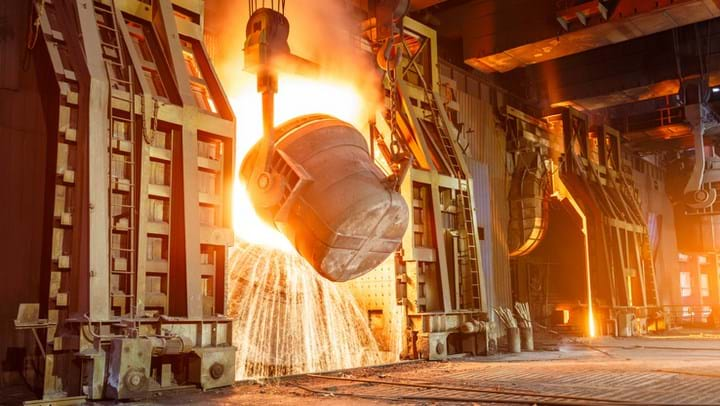Unions hold on to hope as Tata Steel begins decommissioning Port Talbot blast furnace

TATA STEEL UK has begun decommissioning blast furnace 5 in Port Talbot, Wales. The closure, described as “the end of an era”, means unions have now switched their focus to safeguarding jobs and preventing a further blast furnace closure.
Tata confirmed earlier this year that it would close two of the UK’s few remaining blast furnaces, used in primary steel production. It intends to switch to greener and less labour-intensive secondary steel production using an electric arc furnace, threatening the jobs of 2,800 of its 8,000 UK staff.
Dean Cartwright, works manager at Tata, said: “It is of course extremely sad that we have seen the last of operations on blast furnace 5, but we have to look to the future and the opportunity not only to sustain steelmaking here in Port Talbot, but to be an early adopter of electric arc furnace steelmaking of flat carbon steels in Europe.”
Rajesh Nair, CEO of Tata Steel UK, said: “Our challenge is now to focus on a more sustainable and competitive future for our business that will ensure the continuation of steelmaking in the UK for generations to come.”
Tata has said it will support impacted workers with a package including 2.6 weeks’ pay for each year of an employee’s service, up to a maximum of 25 years. All full-time employees will also receive £12,500 (US$16,049) in redundancy payment.
The company’s support plans further include skills training, community support programmes, and job-seeker initiatives.
Union talks and government negotiations
Unions have been fighting to prevent job losses since the closures were first proposed last September, and presented an alternative plan that would have seen one blast furnace remain open until at least 2032. After the closure of blast furnace 5 last week, blast furnace 4 is expected to follow by the end of September.
Trade union Unite was set to strike on 8 July after Tata refused to delay its plans until after the UK’s general election. However, this was called off after Tata threatened to shut blast furnace 4 early due to safety concerns.
Tata and unions Community, GMB, and Unite are now back in talks regarding the company’s plans. Charlotte Brumpton-Childs, national officer for manufacturing at GMB, said the joint unions’ aims for the talks include preventing compulsory redundancies, and getting Tata to commit to maintaining primary steelmaking at Port Talbot by keeping blast furnace 4 operational.
She added hopes that talks between Tata and the new Labour government could contribute to avoiding redundancies and “the industrial sabotage that we stand on the precipice of currently”.
Alun Davies, national officer for steel at Community, said that the closure of blast furnace 5 “marks the end of an era, and it is important now to look forward”.
He added: “To safeguard jobs it is vital the future of Port Talbot steelmaking is secured, and that new investments are made so we can build again for the future.”
Alan Coombs, steel and metals sector representative at Community and chair of the Port Talbot multi-union committee, called on Tata and the newly appointed Labour government to “live up to the commitments they have made and act to secure the future of our industry and our communities”.
In its manifesto, Labour pledged £2.5bn to decarbonise the UK’s steel industry. Some of this investment could go to Tata Steel with Jonathan Reynolds, secretary of state for business and trade, in negotiations with the company. He said: “I do want things in exchange for money we’ll invest with the private sector around jobs and technology.”
Reynolds added that he would ensure that “job guarantees” would be part of negotiations.
However, despite the hopes of government and unions, Tata Steel appears set to move ahead with its closure plans. It said: “We look forward to working with a new government and discussing their plans for steel and a wider industrial strategy, but we will be continuing with our restructuring as planned in order to stem losses of over £1m a day.”
The restructuring will result in the loss of around 1,900 jobs at Port Talbot, 600 around the UK, and a further 300 in the next three years.
While the steel producer said the potential additional investment from government could create new jobs in the future, it will not prevent the expected losses. In talks the company intends to focus on securing sign-off of £500m in support promised by the previous Conservative government. Meanwhile, the company hopes its talks with unions will result in an agreement that includes details on employee support and commitment to future investment plans.
Recent Editions
Catch up on the latest news, views and jobs from The Chemical Engineer. Below are the four latest issues. View a wider selection of the archive from within the Magazine section of this site.




